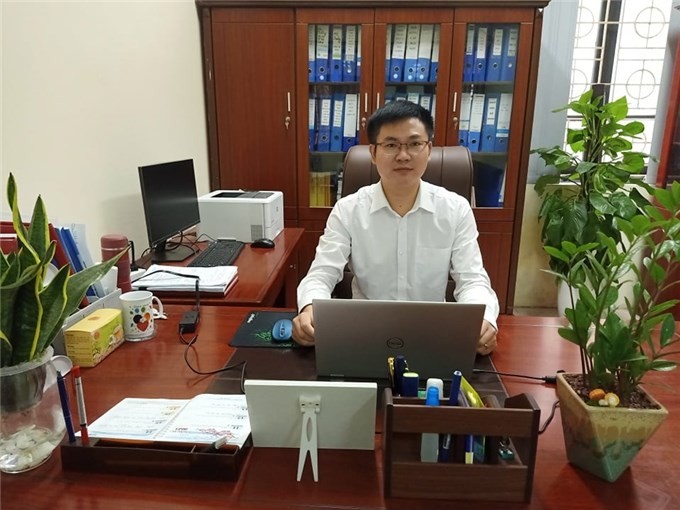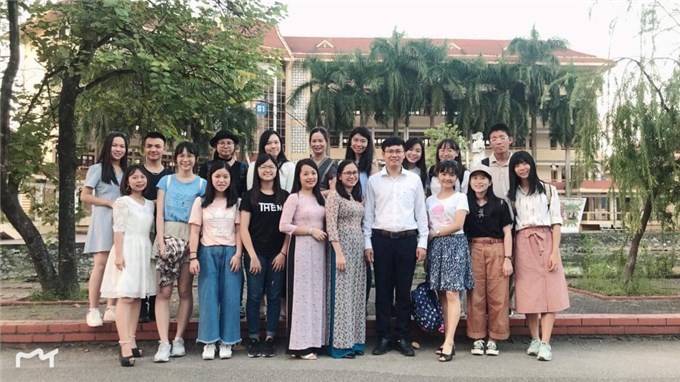
Which are requirements for teachers in the digital environment?
Latest
How has the Covid-19 pandemic affected the digital transformation in education?
Because of Industry 4.0, digital transformation in education is an inevitable trend. In particular, due to the impact of the Covid-19 pandemic, digital transformation is no longer an option but a mandatory requirement for education.
 |
| Assoc. Prof .Dr. Nguyen Danh Nam, Head of the Training Department, Thai Nguyen University. |
For Viet Nam, the Prime Minister approved the "National digital transformation program to 2025, with a vision to 2030" attached to Decision No. 749/QD-TTg dated June 3, 2020. Accordingly, education is one of eight areas that need to quickly adapt to digital transformation.
According to a number of published studies, the Covid-19 pandemic accelerated the global digital transformation process by about 3 to 7 years. Therefore, learners must change the way they learn, have self-study skills and aim to personalize learning with the support of technology, in which online learning plays a decisive role.
It can be seen that learners are more active in the learning process, consciously seeking online courses with the best teachers, regularly interacting with groups through virtual classrooms, online meeting rooms, and online discussion forums.
The Covid-19 pandemic has really made digital transformation happen globally and the habit of online learning and online interaction through technology applications will continue to be strong, even after the pandemic ends in the near future. Therefore, countries need to prepare conditions and institutions to accelerate digital transformation in the education sector.
As you just mentioned, it is necessary to prepare conditions to accelerate the digital transformation process in education, so more specifically, where should this process start?
Digital transformation in education must start from innovating educational and training content and programs to adapt to the constantly changing and evolving technology environment. Digital technology must be used to increase access to education for all, especially students in disadvantaged areas, and learners must be the center of digital transformation in education.
 |
| Universities need to provide mass online courses that are open to all, to boost access to education through digital technology, training to enhance digital skills, towards personalized training. |
In the process of digital transformation, will there be opportunities and challenges?
In digital learning environment, teaching methods are innovated in a more effective direction. Specifically, learners can experience learning via the internet and through mobile devices; learners are provided with many online courses, learning anytime, anywhere and distance learning; using technology to measure student progress and towards personalized learning. This is an opportunity and also a challenge for the educational innovation process in each country.
However, there are also some challenges such as the skills of teachers and learners are limited; digital resources have not been developed synchronously, information technology infrastructure is inadequate, especially in remote and isolated areas, leading to inequality in access to online education.
What is the difference between traditional education and education version 4.0, from your point of view?
Education has changed over the centuries, from the scope of knowledge to the model and space of learning. In the era of Industry 4.0, traditional concepts of learning have changed, opening up a broader and more flexible educational perspective, also known as 4.0 education.
Education 4.0 focuses on creativity and construction capacity. Learners are educated in interdisciplinary knowledge and skills, especially management skills and machine control skills.
Compared with traditional education, education 4.0 has some new characteristics. First, the learning objective is extended. Second, the teacher is the connector. Third, self-study is mandatory. Fourth, the age of learning lasts a lifetime. Fifth, the classroom is anywhere, anytime.
In your opinion, how should a positive learning environment be created for young people to help them gain confidence, develop their abilities and qualities, towards becoming global citizens?
Global citizens are people who live and work in different countries, have one or more nationalities without being constrained by the boundaries, geography and culture of countries in their perception.
They are people who have a very good knowledge base about their country as well as the world, have essential global skills such as communication skills, language ability and global awareness. Therefore, it is necessary to help future citizens develop soft skills, self-reliance, information technology skills and computer proficiency, understanding of artificial intelligence and awareness of civic responsibility so as not to lose national identity.
So, what to do to raise the capacity of young human resources in the future to meet international standards?
To raise young human resources to international standards, countries need to accelerate the digital transformation process in education and develop skills to adapt to digital transformation in the future. There are four basic issues promoting digital transformation in education, namely: developing a national data system for education; developing and exploiting the system of learning materials and digital learning environment; building and implementing a digital competency framework for high school students; developing highly qualified human resources in the field of information technology and digital transformation.
Universities need to develop training disciplines that help strengthen national digital transformation associated with digital technology, such as artificial intelligence, data science, big data, cloud computing, Internet of things, virtual/augmented reality, blockchain, holographic printing; ally an educational model that integrates science - technology - engineering - mathematics and art, business, and enterprise in high schools and held Implement vocational training courses so that students have digital-ready skills.
The Prime Minister has approved the Project "Building a learning society for the period 2021-2030" attached to Decision No. 1373/QD-TTg dated July 30, 2021, in which digital and online technology is needed in organizing teaching and learning activities, contributing to improving the operational efficiency of education and training institutions to meet the learning needs of society.
Every citizen has the responsibility and right to study regularly, learn for life, take advantage of all opportunities to become a digital citizen, a global learning citizen. Therefore, it is necessary to accelerate the implementation of digital transformation and the application of information technology in the organization of lifelong learning activities.





















